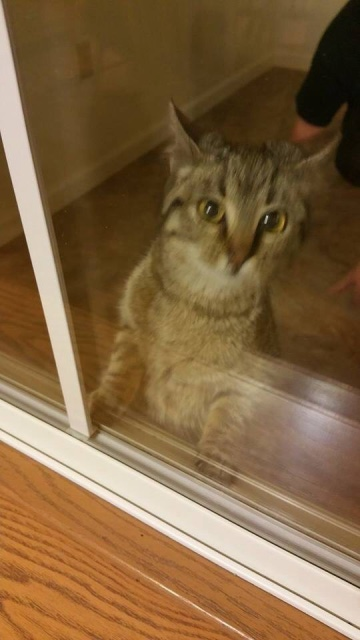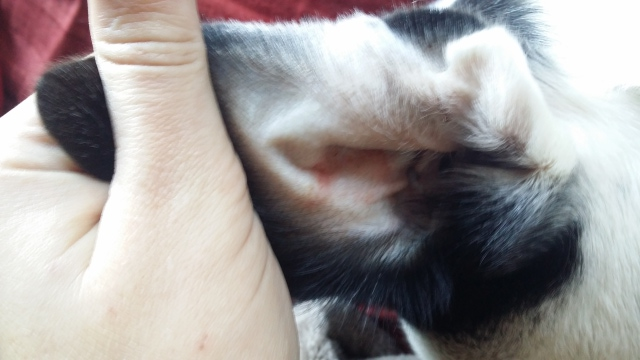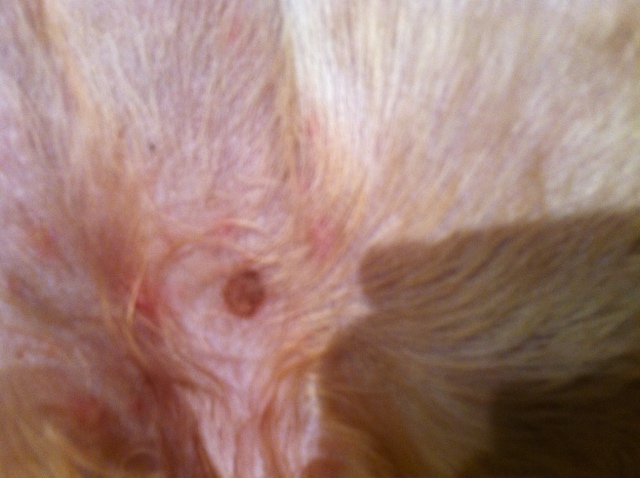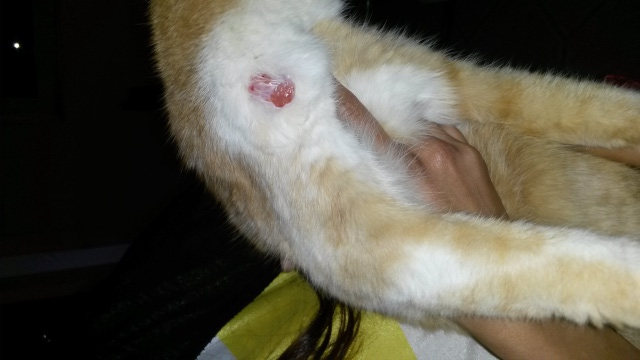Questioni have 2germanshepherds one 9years old and iloosing hair off his back it looks like phoriosis and i can not get rid of fleas on them i have got every thing off the vet but nothing works
AnswerHi Kerry!If your pet is willing to climb into the bathtub,washing his coat with a gentle,nonmedicated pet shampoo will send many fleas right down the drain.If their still scratching after the first bath,try again,this time using a flea shampoo.
As an alternative to bathing try using a dry shampoo,one that foams without water.It is better if your pet will tollerate a real shampoo,but this is certainly better than not bathing him at all.
Mixing a few drops of pennyroyal or eucalyptus oil into your dogs shampoo will help repel fleas.Undiluted pennyroyal oil can be toxic,so it should never be used full-strength.
Pulling a flea comb through your pet's coat once a day will help keep the critters away.Between strokes,dip the comb in a bowl of soapy water to drown any fleas that may be hanging on.
"Blecch!" is what you want fleas to think when they bite into your pet.One way to taint their taste buds is to mix a little garlic and brewer's yeast into your pet's breakfast.Many pets like the taste,so yuo won't have to disguise it.It may very well make the animal unappetizing.
Traditional flea collars impregnated with insecticides can't always handle heavy infestations.In addition,they could be irritating to your pet's skin.A better bet may be to buy a collar that contains a synthetic flea-contolling
hormone like methoprene.They're virtually nontoxic to mammals,and they sterilize flea eggs before they can roll and continue the life cyclel.In warm months when fleas thrive,you may be tempted to buy an electronic,ultrasonic flea collar with all the bells and whistles.Don't waste your money.Not only are the collars not effective,they emit sounds that may be within the hearing range of cats and dogs and could be annoying.
Treating your pet's coat with flea spray will quickly wipe out any visitors that may be dining in.There's a variety of products to choose from.Those containing the insecticides D-limonene or pyrethrins (made from chrysanthemums) are effective and less toxic than some other sprays.You can also buy sparys containing methoprene.When spraying your pet,be sure to keep the insecticide out of their eyes,ears,nose and mouth.You can do this by spritzing a square of gauze and using it to apply the insecticide to his face.When buying any insecticide,make sure the label specifies that it's safe for your pet.Sprays that are safe for dogs can be extremely dangerous for cats.
Flea powders aren't as effective as sprays,but they still can play an important role in flea control.Powder your pets from their necks to their feet,and don't forget the tail.Then work the powder down close to the skin with a comb or brush.When powdering his face,put tiny amounts of powder on your fingertips and gently work it in,avoiding the area around the eyes and nose.
More potent than sprays or powders,flea dip-an insecticide solution in which ou immerse your pet-can provide long-lasting protection.In bad infestations hey may be necessary,but use them with caution.And read the labels carefully.Dips that are okay for dogs can be deadly for cats.
When fleas are showing up in record numbers,you may need to treat the entire house with a house fogger.Vets recommend using products containing methoprene or fenoxycarb,another flea-controlling hormone.Insecticides containing pyrethrins are also safe and effective.
Also known as diatomaceous earth or chinchilla dust,these microscopic algae are safe alternatives to insecticides.They absorb a flea's waxy coating,causing it to dry up and die.Sprinkle the diatomaceous earth on carpeting and upholstered furniture.You can also sweep it into cracks and crevices around baseboards by using a small hand duster.Wear a dust mask and goggles so the tiny particles don't drift into your lungs or eyes.Work them in with a broom,them vaccum them up a few days later.Diatoms,which are sold in pet stores,are inactivated by water,so they can be used only indoors.Be sure to use amorphous diatomaceous earth.The glassified diatomaceous earth used for swimmming pool filters isn't effective against fleas and can be harmful if inhaled.
Vaccuming at least once a week is an extemely effective,nontoxic way to keep the flea population down.Concentrate on areas where your pet spends lots of time,like around his bedding.Be sure to vaccum cracks,crevices and baseboards,and spend plenty of time on rugs.
To prevent fleas from emerging from your Hoover, remove the bag, seal it in plastic and place it in the freezer or in direct sunlight.The extreme temperatures either cold or heat will help kill the fleas.
Whenever fleas are a problem plug in the night lightand put a wide pan partially filled with water underneath.Since fleas are attracted to warmth, some will leap toward the ligh and make a splashdown in the water, where they'll drown.
The fewer rooms your pet has access to the fewer rooms you'll have to worry about.Washing your pets beddign at least once a week will help keep fleas at bay.If your pet sleeps on a pad or thick bed thats tough to wash giet in the habit of protecting it with a small sheet or a large towel that you can wash once a week. When you remove the towel,be sure to rill it up carefully in order to trap fleas and thier eggs.
To control yard infestations, many experts recommend using nematodes-microscopic worms that prey on larvae and pupae of many insects including fleas. They are available at pet and garden stores.Follow the dorections on the label just put them in a hose sprayer and blast away,aim at damp,shaded areas where fleas thrive.
As for them loosing hair,I would recommend having their Thyroid checked as hair loss and slow hair regrowth is a symptom of under active thyroid. If you are noticing any increased thirst or urination, then I would recommend a chemistry screen to check for elevated ALKP which can indicate Cushing's Disease. If all the tests are normal, then I would be concerned about seasonal alopecia, which sometimes responds to melatonin but the hair loss is usually along the sides of the body not where you describe.
This may also just be part of the whole flea thing that's going on.Your best bet is to have your vet eprform an examinateion on them to find the diagnosis and treatment for losing hair.
I hope this is helpful and good luck!Please keep me posted!Give those Gemend Shephards some kisses for me!
Nicole.D.

 Cat breed, safe for family?
Question
The kitten
I found a kitten a couple da
Cat breed, safe for family?
Question
The kitten
I found a kitten a couple da
 red bumps in dogs ear
Question
left ear
My puppy has red bumps in her
red bumps in dogs ear
Question
left ear
My puppy has red bumps in her
 Chihuahua & eye issue
Question
redeye
Hi. Firstly, thank you for taking the t
Chihuahua & eye issue
Question
redeye
Hi. Firstly, thank you for taking the t
 Red Blisters on Dog Belly
Question
Raley Belly
Yesterday I noticed a round
Red Blisters on Dog Belly
Question
Raley Belly
Yesterday I noticed a round
 Cat with bump on neck/ shoulder
Question
Wound
Hi, I have a 20 year old female
Cat with bump on neck/ shoulder
Question
Wound
Hi, I have a 20 year old female